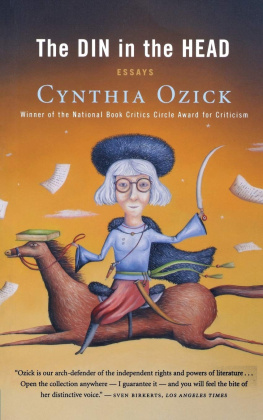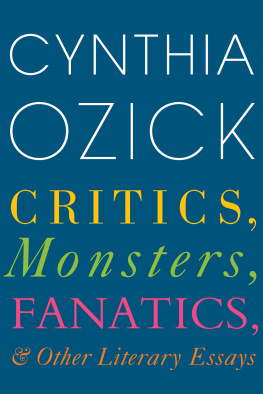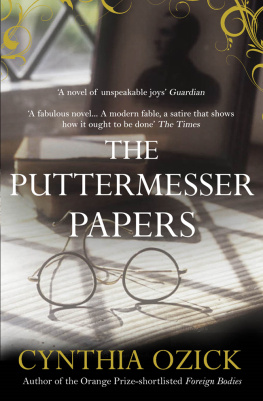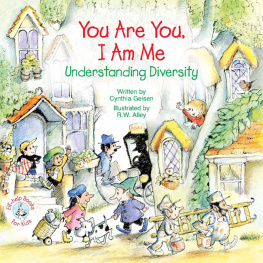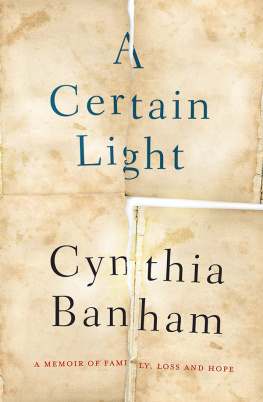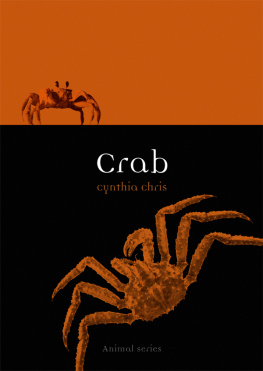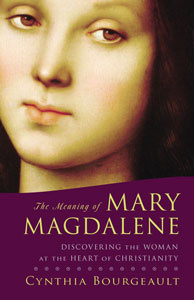Cynthia Ozick - The Din in the Head
Here you can read online Cynthia Ozick - The Din in the Head full text of the book (entire story) in english for free. Download pdf and epub, get meaning, cover and reviews about this ebook. year: 2007, publisher: Mariner Books, genre: Non-fiction. Description of the work, (preface) as well as reviews are available. Best literature library LitArk.com created for fans of good reading and offers a wide selection of genres:
Romance novel
Science fiction
Adventure
Detective
Science
History
Home and family
Prose
Art
Politics
Computer
Non-fiction
Religion
Business
Children
Humor
Choose a favorite category and find really read worthwhile books. Enjoy immersion in the world of imagination, feel the emotions of the characters or learn something new for yourself, make an fascinating discovery.
- Book:The Din in the Head
- Author:
- Publisher:Mariner Books
- Genre:
- Year:2007
- Rating:3 / 5
- Favourites:Add to favourites
- Your mark:
- 60
- 1
- 2
- 3
- 4
- 5
The Din in the Head: summary, description and annotation
We offer to read an annotation, description, summary or preface (depends on what the author of the book "The Din in the Head" wrote himself). If you haven't found the necessary information about the book — write in the comments, we will try to find it.
The Din in the Head — read online for free the complete book (whole text) full work
Below is the text of the book, divided by pages. System saving the place of the last page read, allows you to conveniently read the book "The Din in the Head" online for free, without having to search again every time where you left off. Put a bookmark, and you can go to the page where you finished reading at any time.
Font size:
Interval:
Bookmark:
HOUGHTON MIFFLIN COMPANY
BOSTON NEW YORK
Copyright 2006 by Cynthia Ozick
All rights reserved
For information about permission to reproduce selections from
this book, write to Permissions, Houghton Mifflin Company,
215 Park Avenue South, New York, New York 10003.
Visit our Web site: www.houghtonmifflinbooks.com.
Library of Congress Cataloging-in-Publication Data
Ozick, Cynthia.
The din in the head : essays / Cynthia Ozick.
p. cm.
ISBN -13: 978-0-618-47050-1
ISBN -10 0-618-47050-6
1. Literature, Modern20th century
History and criticism. I. Title
PN 771.099 2006
809'.04dc22
2005016102
N OTE : The essays on Helen Keller, Lionel Trilling,
and Gershom Scholem originally appeared in The New Yorker.
Illustrations David Levme
Book design by Anne Chalmers
Typefaces. Janson Text, Deepdene, Type Embellishments
Printed in the United States of America
MP 10 9 8 7 6 5 4 3 2
For
Samuel and Rosie,
some day
I am grateful for the kind attention of the literary editors who welcomed these essays in their first incarnations; and I am especially indebted to Henry Finder, Leon Wieseltier, and Anne Fadiman.
My thanks also to David Levine, whose ingenious drawings punctuate these pages.
On Discord and Desire
What Helen Keller Saw
Young Tolstoy: An Apostle of Desire
John Updike: Eros and God
Throwing Away the Clef: Saul Bellow's Ravelstein
Washington Square: So Many Absent Things
Smoke and Fire: Sylvia Plath's Journals
Kipling: A Postcolonial Footnote
Delmore Schwartz: The Willed Abortion of the Self
Lionel Trilling and the Buried Life
Tradition and (or versus) the Jewish Writer
Henry James, Tolstoy, and My First Novel
Highbrow Blues
The Din in the Head
The Rule of the Bus
Isaac Babel: "Let Me Finish"
In Research of Lost Time
The Heretical Passions of Gershom Scholem
And God Saw Literature, That It Was Good: Robert Alter's Version
AFTERWORD
An (Unfortunate) Interview with Henry James
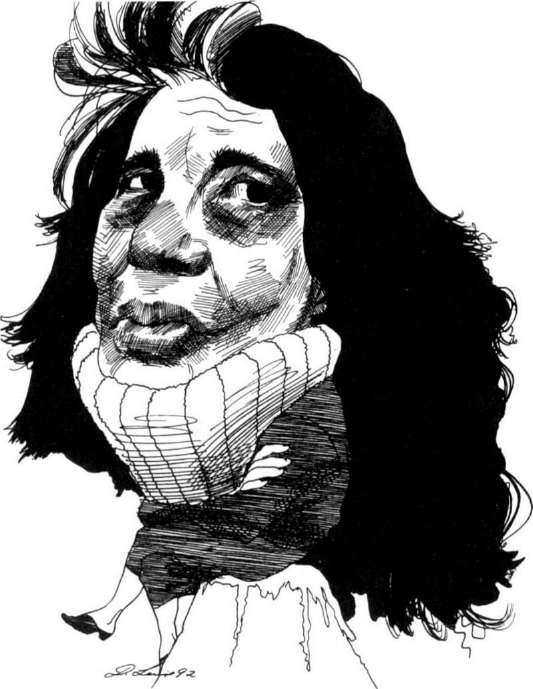
W HEN SUSAN SONTAG DIED in the winter of 2004at seventy-one, far too soon for her powers to have been exhausted or her intellect slakedshe left a memorable and mottled trail. Much of her life will endure in photographsbut cameras, she argued, do not so much defeat transience as render it "more acute." Still, here she is on the back cover of my browning paperback copy of The Benefactor.; a first novel published in 1963, when she was thirty: dark-haired, dark-browed, sublimely perfected in her youth. The novel, which reads like an audacious, sly, somewhat stilted translation from the French of a nineteenth-century philosophical memoir, ends with "a photograph of myself'the self of the old narrator, who is contemplating his death. How distant death must have seemed to the young novelist then! In another photograph, dated 1975, she is lying on her back, hands under her head, with strongly traced Picasso eyelids and serene lips less curled than Mona Lisa's: beautiful at forty-two. Like any celebrity, she could be watched as she aged. Ultimately there came the signature white slash through the blackened forelock, and the face grew not harder but hardier (despite recurrent illness, throughout which she was inordinately courageous). She had a habit of tossing back her long loose hair when it fell, as it did from moment to moment, over her eyes: the abrupt shake of the head, once girlish, turned incongruous in the sexagenarian. She was tall and big-shouldered. She dominated any room, any platform; her voice was pitched low, mannish, humorous, impassioned, impatient. She was more than a presence: it was as if she had been inscribed in a cartouchea figure who had, in effect, founded the culture in which she moved. And wherever she moved, the currents flowed with her.
Only her politics could not be said to be mottled: it was all of a piece, early and late, standard-issue and stereotypical: you could find its like in any university or elitist periodical in the Western world. Her politics, to which she gave so much of her vitality, some of it bravely (in Sarajevo), some of it reflexively (almost everywhere else), was, I think, the least interesting because the most commonplace part of her, though it ran deep and she valued it: it contributed to her celebrity and sometimes to her notoriety. But her celebrity was not her fame. Her fame erupted out of the publication in Partisan Review of "Notes on Camp," the 1965 essay that brought her instant recognition, in which she defined taste as the paramount contemporary aesthetic principle. "Taste," she wrote, "governs every freeas opposed to rotehuman response. Nothing is more decisive. There is taste in people, visual taste, taste in emotionand there is taste in acts, taste in morality. Intelligence, as well, is a kind of taste: taste in ideas."
With this manifesto she nearly single-handedly (though she soon had an army behind her) altered the culture. "The best that has been thought and said"Matthew Arnold's exalted old credo, long superannuateddevolved to "Whatever." If taste governs all, then distinctions melt away, and the jihadist's "taste in morality" is no worse than mine or yours, and choosing life or choosing death comes down to chacun a son got.
But set all that aside: it counts as politics, so let it go. The culture of art is where Sontag left her indelible and individual mark; and fame is when the individual becomes the general. As she prophesied in Against Interpretation, published in 1964,
All the conditions of modern lifeits material plentitude, its sheer crowdednessconjoin to dull our sensory faculties. And it is in the light of the condition of our senses, or capacities (rather than those of another age), that the task of a critic must be assessed. What is important now is to recover our senses. We must learn to see more, to hear more, to feel more.
This was less a summons to hedonism (though it was that too) than it was a denigration of history. The emphasis on "now," the quick dismissal of "another age," the repeated "our," the ardent call to see, hear, feel, meant that one would be open to seeing and hearing and feeling nearly everything that lay in one's path. It meant fusion rather than separation, it meant impatience with categories, it meant infinite appetite, it meant the end of the distinction between high and low. And the end of that distinction made a cut in the common understanding, so that Norman Mailer, for instance, could write of rampant subway graffiti by urban vandals as others had written of Bernini and Matisse. And oddly, oddly, oddly!the newly elitist doctrine of "the condition of our senses" came to resemble the "I know what I like" of the once-upon-a-time philistines and Babbitts.
The cut has been made; there is no going back. Yet Sontag herself did, in her final years, long to go back. At a symposium only months before her death, condemning the prevalence of "the idea that anything is better than anything else," she announced what amounted to a catchall self-repudiation: "It is the triumph of a pernicious relativism.... I am certainly not prepared to say the satisfactions derived by art are no different structurally, in content, or in quality, or in importance, from other kinds of satisfactions. I am not prepared to think that the satisfaction that I might get in front of a Chardin, a Vermeer, or a Vuillard, is in any way similar to the satisfaction I would get watching a beautifully pitched baseball or inspecting a shoe collection." And she reflected in a late interview that she wished she had written novels instead of the essays that had overturned public sensibility: she had since reawakened to the seductions of the novel in its traditional realist dress. The two novels that were her last were light-years from her firstin tone, in structure, in aspiration.
Next pageFont size:
Interval:
Bookmark:
Similar books «The Din in the Head»
Look at similar books to The Din in the Head. We have selected literature similar in name and meaning in the hope of providing readers with more options to find new, interesting, not yet read works.
Discussion, reviews of the book The Din in the Head and just readers' own opinions. Leave your comments, write what you think about the work, its meaning or the main characters. Specify what exactly you liked and what you didn't like, and why you think so.

